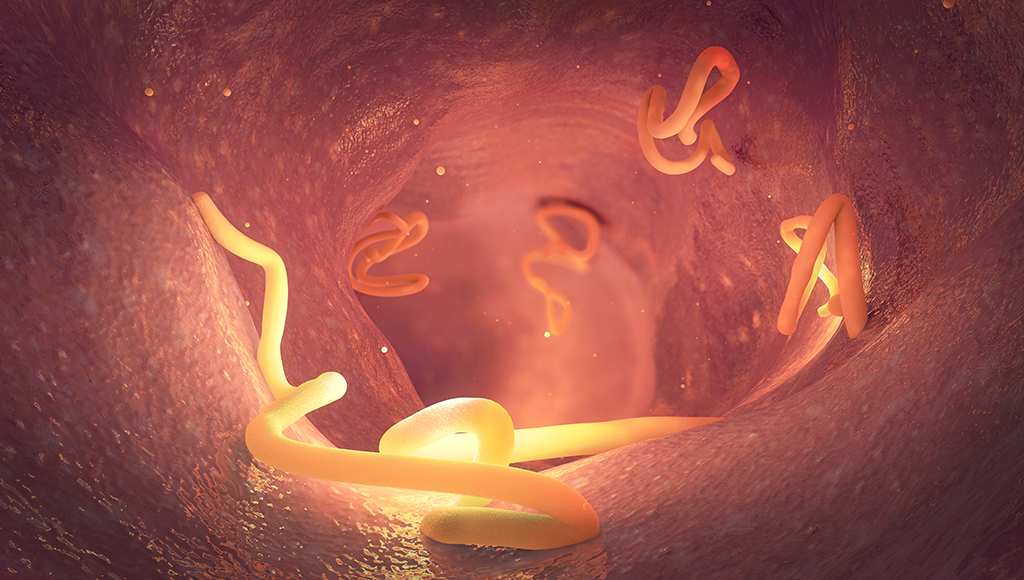Tapeworms in Cats and Dogs
These parasites can deprive your pets of important nutrients and compromise their health.

Tapeworms are parasites which affect dogs and cats. They reside in the intestines and although they rarely cause clinical symptoms or disease in pets, they do rob their hosts of important nutrients. Tapeworms are also aesthetically unpleasant. The most common type of tapeworm is spread by fleas. Pets contract this species of tapeworm when they swallow fleas while grooming themselves. Other tapeworms are spread through improperly prepared food. Tapeworms are relatively easy to prevent and to eliminate. Keeping your pets free of tapeworms is important for both your pets' health, as well as the health of the human caregivers who come into contact with them. Tapeworms can spread to humans in some circumstances.
Symptoms
Tapeworms rarely cause pets to feel sick, and some pets with tapeworms will show not show any outward signs of infestation. Shedding of tapeworms segments in the feces is the most common symptom of tapeworm infestation in pets. Owners often notice the segments in bowel movements, around the pet's anus, or on their bedding and places they regularly lay. The segments are small pieces of the worm, and they look like grains of rice or, when dry, like sesame seeds. A pet that is infested with tapeworms may experience itching or irritation of the anus. Diarrhea is an infrequent symptom of tapeworms.
Risk Factors and Prevention
Fleas spread the most common type of tapeworm (called Dipylidium) in dogs and cats. Animals who do not receive proper flea control are at increased risk of infestation. Other tapeworms (called Echinococcus) can be contracted from raw meat. Animals whose diets contain improperly prepared raw meat can develop tapeworm infestations. Pets that hunt and consume prey animals, such as moles, mice or birds can also contract tapeworms. Dogs who eat feces may also contract Echinococcus tapeworms.
Complications
Tapeworms rarely cause illness in pets; however, they deprive pets of essential nutrition. This nutritional deprivation can result in a failure to thrive, grow and maintain a proper body weight. Tapeworms may also lead to diarrhea or obstruction of the intestines.
It is important to know that tapeworm segments are mobile and can lead to significant contamination of the house and environment where the infected animal dwells. Because tapeworms can spread to human beings, children are especially at risk, since they are naturally not as cautious or worried about cleanliness as adults. Humans can can occur without their knowledge in a home infested with fleas. Humans can develop infestations with Echinococcus tapeworms by eating the parasites' eggs. These eggs are found in the feces of infested pets; therefore it is critical to wash your hands thoroughly every time after handling cat boxes or cleaning pet areas and kennels.
Diagnosis
Tapeworm infestations usually are diagnosed by observing tapeworm segments in feces, on bedding, or around the anus. Diagnosis occasionally is made through microscopic evaluation of a specially prepared sample of feces.
Treatment and Prevention
Praziquantel (Droncit®) is the most frequently used medicine in the treatment of tapeworms. In many cases, a single dose of praziquantel will clear tapeworms from a pet. The medicine can be given orally, topically (as a part of Profender® deworming agent for cats) or by injection. Your veterinarian will be able to advise you on which is better suited for your pet. Proper flea control should be implemented to reduce the risk of re-infestation.
Pets stop shedding tapeworm segments soon after receiving effective treatment. If the source of the tapeworm infestation (fleas or raw meat) is not eliminated, the chances of re-infestation are high. The best way to prevent tapeworm infections is by practicing adequate flea control. Restraining pets from hunting and not allowing ingestion of raw or undercooked meals is also necessary to prevent the spread of tapeworms to dogs and cats.
Ready to start saving money on pet wellness care?
Then take a look at Mint Wellness, the pet wellness plan that provides fast reimbursement on routine pet care. Save on vaccinations, wellness exams, preventatives, dental, and more!
Learn More


